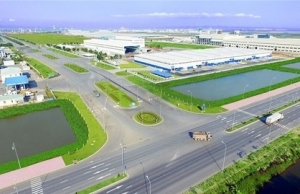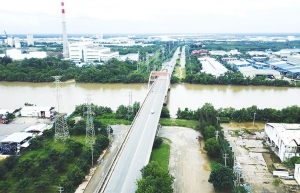Developers eager to cultivate funding in industrial real estate
Vietnam Rubber Group (VRG) is completing its restructuring scheme for 2021-2025 to submit to the Committee for Management of State Capital at Enterprises. One of the highlights is that industrial real estate will be one of three core business sectors, and the company will foster divestment from the rubber sector to mobilise resources for the industrial real estate sector.
 |
| Developers eager to cultivate funding in industrial real estate - illustration photo |
VRG general director Le Thanh Hung said that by 2025, the group’s revenue is expected to increase by 30 per cent, and profit will increase by 25 per cent. The group’s consolidated revenue is expected to climb to VND161 trillion ($7 billion), and consolidated pre-tax profit will be $1.49 billion. The after-tax profit of the parent company will be $536.9 million.
“To achieve the above goals, the group will apply for a license to convert part of the rubber area to land for industrial production, contributing to improving economic efficiency,” Hung said.
Currently, VRG manages nearly 492,000 hectares of rubber plantations, 342,000ha of which are in Vietnam, with the majority in the Southeast region and Central Highlands.
According to the industrial real estate development strategy for 2021-2030, VRG plans to develop 48 industrial parks (IPs) with a total area of 37,400ha and 28 industrial clusters with a total area of 1,800ha, which will be mobilised from converted rubber plantation areas.
VRG is managing 12 IPs with a total area of 6,000 hectares, of which it has filled over 4,000ha of the subleasing land and warehouse. New projects such as the expansion of Nam Tan Uyen IP, An Dien, and Minh Hung III are in the process of implementing legal procedures for investment.
Leaders of Binh Phuoc People’s Committee will support the group in the conversion. At a meeting in late August, Vice Chairman Huynh Anh Minh asked departments to conduct detailed surveys on the areas to be converted. The province will prioritise IP and high-tech agricultural projects funded by VRG and its members.
In early September, DIC Group announced plans to establish a subsidiary called DIC Urban and Industrial Zone Development Co., Ltd. (DIC Urbiz) through a capital contribution by the board of directors.
The new member company has a charter capital of $2.17 million. The main task of DIC Urbiz is to implement procedures to be selected as an investor for projects in IPs, export processing zones, or high-tech parks.
DIC Urbiz will be the 13th subsidiary of DIC Group, but the first in industrial real estate.
Nguyen Thien Tuan, chairman of the board at DIC Group, said that industrial real estate was an attractive investment channel. Previously, when the Ministry of Construction entirely managed DIC Group, the group was allocated to develop urban real estate. After restructuring and divestment of the state-owned stake, the group is pivoting to industrial real estate.
Matthew Powell, director of Savills Hanoi said, “Vietnam is still the leading investment destination for investors. Meanwhile, China still maintains a strict pandemic policy, which has shifted international business to other countries in Southeast Asia, especially Vietnam.”
Foreign capital inflows are still pouring into the country while existing IPs and economic zones have an average of 70.9 per cent fulfilment. In Hanoi, Bac Ninh, and Bac Giang, the fulfilment ratio is up to 96 per cent, which shows the urgent need for new IPs and economic zones.
Several hurdles remain and VRG, for example, may not find it easy to convert rubber plantation areas to industrial land. Despite grand ambitions, the reality of converting land is not easy.
According to MB Securities, the area that VRG wants to convert must come under the locality’s socioeconomic plan, and the group also needs the approval of the Vietnamese prime minister.
“The selling prices of surrounding land areas planned for investment projects are fluctuating. Investors may discover difficulties negotiating compensation with property owners and find it takes a long time for land clearance,” said Tran Dai Nghia, an investment project policy advisor.
| On October 6, the Department for Science, Education, Natural Resources and Environment under the Ministry of Planning and Investment will cooperate with the Korea Energy Agency and carbon-neutral solutions group Verywords to organise a conference themed “Promoting Green Growth in the Industrial Sector: the Orientation to Develop Eco-industrial Parks in Vietnam”. The conference is to be held in Daewoo Hanoi Hotel. The conference has been organised in the framework of the “National Strategy on Green Growth for 2021-2030, with a vision to 2050”. The participants will discuss the strategy and policy for developing infrastructure in eco-industrial parks in Vietnam. It is an occasion for enterprises to study partners which specialise in developing infrastructure for eco-industrial parks, as well as the opportunities for cooperation between domestic and South Korean enterprises. |
 | Industrial park approved for Vinh Phuc Province Vinh Phuc Province has announced an investment project for the Dong Soc Industrial Park, which will cover 207ha with a total investment of nearly VND2.23 trillion (US$96.9 million). |
 | Waste criteria lacking for nation’s IPs Vietnam’s industrial parks are in the process of transitioning to more ecological models, but are struggling due to a lack of regulations on reusing treated waste and wastewater. |
What the stars mean:
★ Poor ★ ★ Promising ★★★ Good ★★★★ Very good ★★★★★ Exceptional
Related Contents
Latest News
More News
- Sembcorp Development secures licence for VSIP in Khanh Hoa (December 31, 2025 | 18:54)
- Prodezi Long An advances towards integrated eco-centric industrial park model (December 26, 2025 | 11:16)
- Amata to develop $185 million Amata City Phu Tho (December 23, 2025 | 17:49)
- Work starts on Nhat Ban – Haiphong Industrial Zone Phase 2 (December 19, 2025 | 16:43)
- Becamex – Binh Phuoc drives sustainable industrial growth (November 28, 2025 | 15:22)
- South Korean investors seek clarity on IP lease extensions (November 24, 2025 | 17:48)
- CEO shares insights on Phu My 3 IP’s journey to green industrial growth (November 17, 2025 | 11:53)
- Business leaders give their views on ESG compliance in industrial parks (November 15, 2025 | 09:00)
- Industrial parks pivot to sustainable models amid rising ESG demands (November 14, 2025 | 11:00)
- Amata plans industrial park in Ho Chi Minh City (November 04, 2025 | 15:49)

 Tag:
Tag:



















 Mobile Version
Mobile Version